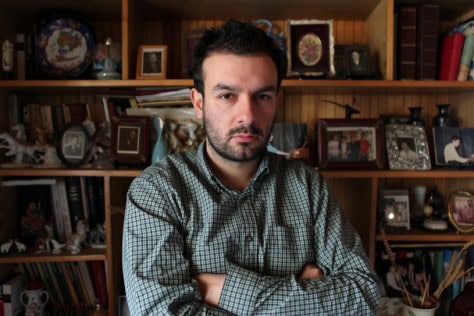Irvine Welsh’s latest novel, Crime, is a tale of a Scottish cop on vacation in Miami who becomes accidentally entangled with a child sex ring. We sat down with the author in Brooklyn to discuss his research for the book, plus a few of his upcoming film projects, including a mockumentary about professional darts.
You live in Florida during the summers. Why do you spend so much time there, and what made Miami an appropriate location for this book?
Well, originally the first time I was over there was for the Winter Music Conference, about ten years ago. I had a great time, I really liked the place and I kept going back. About three years ago I bought a place over there, in Miami Beach, in the Art Deco district. It’s an interesting place because it’s so vibrant, it’s a real frontier town, Miami. Everybody that’s been knocked up or down in a job or a relationship…
They end up there.
It’s also a point of embarkation for people. It’s really where new Americans come in. It’s like Ellis Island two hundred years ago, or LA fifty years ago. People coming to America for the first time. That gives it a kind of vibrancy. It gives it an edge. But also, there are a lot of rootless and displaced people there as well. It’s got a kind of noir-ish kind of feel to it too.
In the acknowledgments you talk about some of your research for Crime, and I was curious about how you got that access…
The sexual survivors group was very very difficult. When you hear somebody talk about what’s happened to them, it’s kind of beyond anything that you could make up in fiction. The girls that get, from a very early age, the kind of systematic abuse… they’ve got to a point where it is a conversational thing and not an emotional thing and it’s very hard to listen to that because [they’ve] obviously suffered and you kind of express an empathy to that and you want to kind of listen and it’s uncomfortable to listen.
It was also good to see what people do; most people are going to try to forget about it and get on with what they do, and it was great to see the way they do get over it. And some people get over it in ways that are terrible. So it was very different than what I usually do—I’m interested in how people fuck up and I think we live in such a difficult world and I’m interested in how people confound the difficulty and make it into their own… But this thing was different. The whole thing was so deep that I was interested in how people actually heal themselves…
The one thing I realized when I started to write about pedophilia and child abuse, it’s not like writing about drugs or violence or whatever; there’s no moral ambiguity at all, it’s just illegal and wrong and there’s nothing you can do. And because of that, it’s actually very boring to write about. Pedophiles are very boring to write about. There’s no dynamic to them. So the book couldn’t be about that. It had to be about how people get over something, how to transcend it and work together to help each other. It’s probably [a] more important book than I’m used to writing, more upbeat.
When you interviewed people about their experiences, did you approach them as a novelist?
Yeah, it’s a very important thing to do. The most important thing that people have in these situations is their anonymity. It was important that they knew that I wasn’t using their story, but to get a kind of feel for the whole kind of issues and things like that. Once you have their confidence it’s not actually about exposing them, you’re operating in a different way than a journalist. And usually they accommodate, because people want to talk about something that happened in their life, but only the right people in the right circumstances.
Did you encounter anyone who thought you would need to experience those things yourself in order to write about it? Any aggression as far as “what right do you have to be telling this story”?
It’s a difficult one. My [previous] books for example were more experiential, were written about more experiential drug addictions. This one, thankfully, [I] had no experience about [being] sexually abused like that. But you see a couple kids and you see, you recognize now that they were really forcibly abused in some kind of way. And recently, a pal of mine he had kind of told us at his father’s funeral, he had told us that his father and his brother had abused him. That was harrowing but… the way we all responded to it—we pretended not to hear it in a way, because we didn’t have the emotional capacity to deal with that…
Are you more in favor of punishment or rehabilitation for sex offenders? Do you imagine a sex offender going through this and getting out of jail in ten years and not being a threat anymore?
It’s very very difficult because established sex offenders do re-offend again. You’ve got pedophiles and they have to be controlled but we have to make an attempt to rehabilitate, otherwise we’re never going to understand the whole nature of it. It seems to be kind of with us since time began and it’s important to understand the mechanisms that make you behave that way and the extent that you can control. A lot of the research says that it’s very very difficult for a pedophile to conceive that they’ve actually done something wrong and that it’s really inappropriate to sexualize children and all that… But anyway, that’s why it helped me, these evaluations from people. Some people did not have any kind of rehabilitation at all. There’s not even remorse, just no understanding about what they did.
And if you look in Lolita, the greatest book that’s been written on the subject… the book almost says that it’s okay to be a pedophile if if you’re an artist of you’re an intellectual or all that. And it’s not okay. I was kind of writing against that kind of idea. Against that kind of glorification of that kind of behavior in a way.
I had a few other questions beyond Crime. Your work on this Meat Trade movie, I don’t know where that’s at…
It’s actually financed now, and cast with Colin Firth and Robert Carlyle. Hopefully at the end of this year, beginning of next year it should shoot, but… I wrote a screenplay about nine years ago, eight years ago and they’ve been trying all this time and it looks like they’re finally getting that. We’ll all believe it when we see it.
What’s holding it up, financing?
Yeah financing. You get a couple of name actors and people will finance based on that. And then one of them pulls out and they start the whole process all over again. And this happens so much, and it happens all the time.
And the funny thing is, I did the screenplay [for Good Arrows] very quickly and [got it] financed straightaway. It’s a TV film. They are just starting to shoot it and when I get back we’ll edit it. And we’ll cut a separate one to take around, to sell to international markets.
What’s the film about?
It’s a kind of mockumentary about the world of British professional darts. There’s four brilliant actors in it. There’ a guy called John Owen, [this] good-looking, handsome Welsh actor who wears this big fat suit. He does a brilliant performance. It’s really harrowing and witty and funny.
 Q&A with Larry Gus
Q&A with Larry Gus We Own the Night: The Edison
We Own the Night: The Edison
No Comments